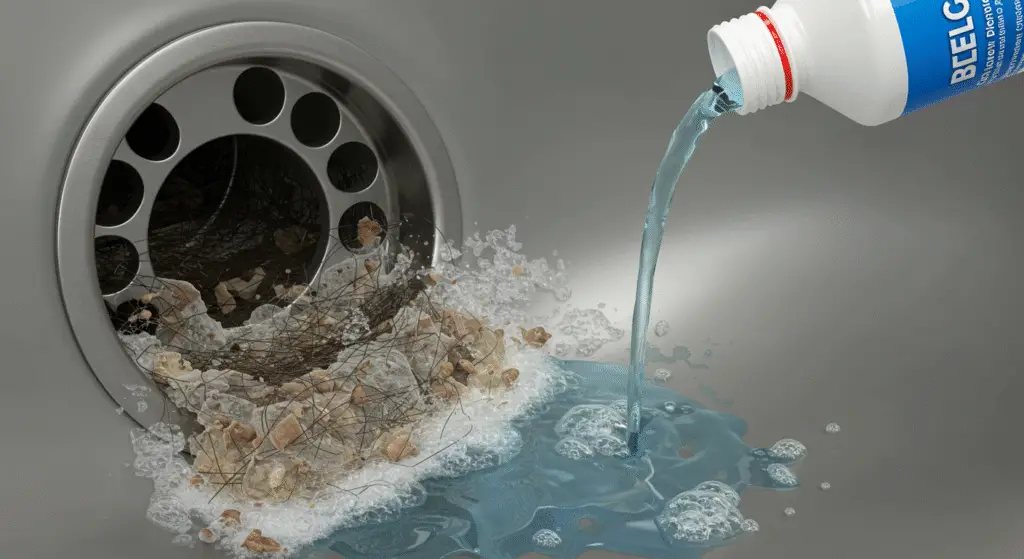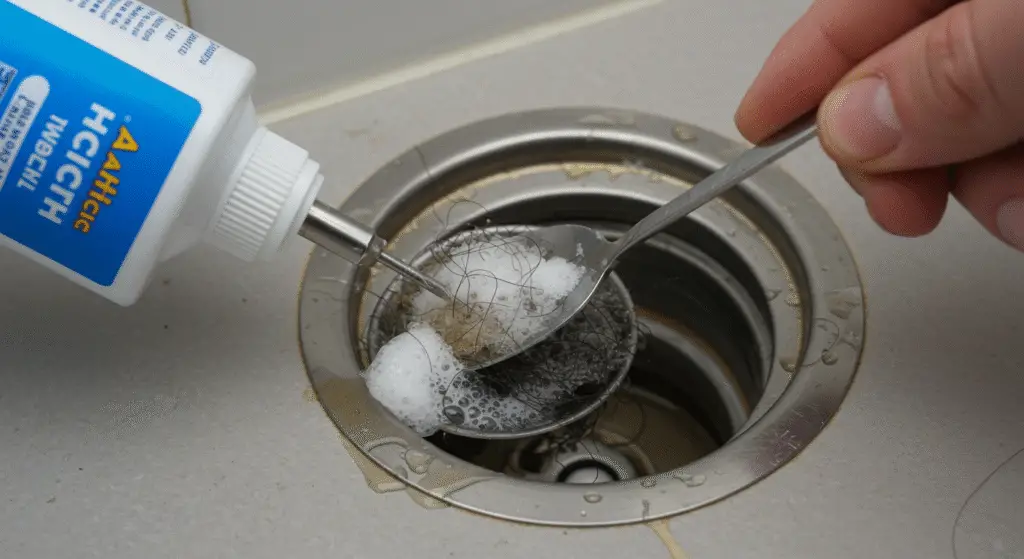
Can bleach unclog a drain? It’s a common question many homeowners ask when dealing with a slow or blocked sink. Bleach is known for being a powerful cleaner, and since it’s already in most households, it feels like a quick fix. But while bleach can disinfect and deodorize, it’s not always clear if it can actually remove clogs. In this post, we’ll take a closer look at how bleach works, when it might be helpful, and what alternatives may work better for clearing your drains.
Is Using Bleach on a Clogged Drain a Good Idea?
When it comes to cleaning, bleach is often the first thing people reach for. It’s great for disinfecting, killing bacteria, and removing stains. Because it’s strong, it seems like it should help clear a clog too. But can bleach unclog a drain reliably?
Bleach can sometimes help with light buildup. It may break down some organic matter like food residue or soap scum, but it won’t do much for things like grease, hair, or other thick materials. It’s more of a surface cleaner than a deep unclogging agent.
What Happens If You Pour Bleach Down a Drain?
When you pour bleach into a drain, it runs through the pipes and may clean the inside surfaces. It can kill bacteria and remove odors, which makes your sink smell better. But it doesn’t always move blockages. If the clog is made of hair, grease, or solid materials, bleach usually won’t help much.
There’s also a safety concern. Bleach can be dangerous when mixed with other cleaning products. For example, never combine bleach with ammonia or vinegar, as this can create toxic fumes.
How Does Bleach Compare to Store-Bought Drain Cleaners?
Bleach is a strong household cleaner, but it’s not designed for clogs. On the other hand, drain cleaners you find at the store are made specifically to break down things like hair and grease. They usually contain stronger chemicals that can dissolve clogs more effectively than bleach.
Still, even store-bought cleaners should be used with caution. Too much chemical use can damage your plumbing over time. For safety and effectiveness, it’s usually better to try safer methods first before using strong chemicals.
Can Bleach Help Prevent Future Clogs?
While it may not work well for removing clogs, bleach can sometimes help prevent them. If you pour a small amount of bleach down your drain once in a while, it might help keep things clean and reduce bacteria and odors.
For this, use about one cup of bleach followed by a gallon of hot water. Let it sit for about 15 minutes before rinsing. This won’t remove a big clog, but it can help with general drain maintenance and keep things smelling fresh.
What Do Plumbers Think?
Professional plumbers often don’t recommend using bleach to fix clogs. They know from experience that it doesn’t work well on stubborn blockages. Most clogs are caused by things like grease, food scraps, or hair—all materials that bleach can’t break down easily.
In fact, using bleach too often can actually harm your pipes, especially if they’re older or made of metal. The chemicals in bleach can wear down the inside of pipes and damage rubber seals over time.

Better Ways to Unclog a Drain
If bleach doesn’t work, what should you do instead? There are several simple and safe methods you can try.
One of the easiest things to do is pour boiling water down the drain. This can melt grease and move small blockages. Another natural option is using baking soda and vinegar. Pour half a cup of baking soda down the drain, then add half a cup of vinegar. Let it bubble and sit for about 30 minutes, then rinse with hot water.
You can also try using a plunger or a drain snake to physically remove whatever is blocking the pipe. For more stubborn clogs, enzyme-based cleaners are a great option. They use natural ingredients to break down organic material without harming your pipes.
Should You Rely on Bleach for Drain Problems?
In most cases, bleach shouldn’t be your first choice for unclogging a drain. It’s better at killing germs than moving clogs. So if you’re asking can bleach unclog a drain, the answer is usually no—not on its own.
That said, it can still be helpful as part of your regular cleaning routine. Just remember that if you have a real clog, it’s better to use a method that’s designed for removing blockages.
When to Call a Plumber
Sometimes no home solution will work, and that’s when it’s time to call in a professional. If your sink or tub still won’t drain after trying bleach, baking soda, or a plunger, you may be dealing with a deep clog or a problem with your plumbing system.
Other signs you need a plumber include bad smells coming from the drain, water backing up in other sinks or tubs, or strange gurgling noises. These are signs of a more serious issue that bleach won’t solve.
Final Thoughts
So, can bleach unclog a drain? It might help a little with mild buildup or odors, but it won’t fix a real clog. Bleach is better used for disinfecting and maintenance than for clearing blockages. If your drain is truly clogged, try boiling water, baking soda and vinegar, or a plunger. For anything serious, it’s best to contact a plumber.
Keeping your drains clear doesn’t have to be complicated. With the right approach, you can handle minor issues on your own and keep your plumbing in good shape for years to come.
